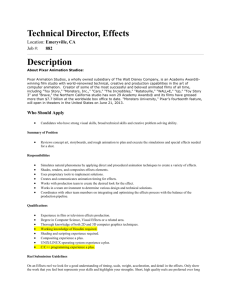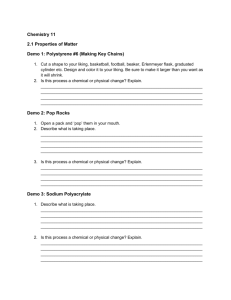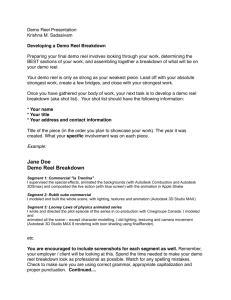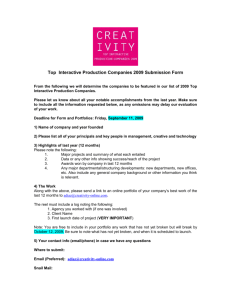Door to the future* - The University of Texas at Dallas
advertisement
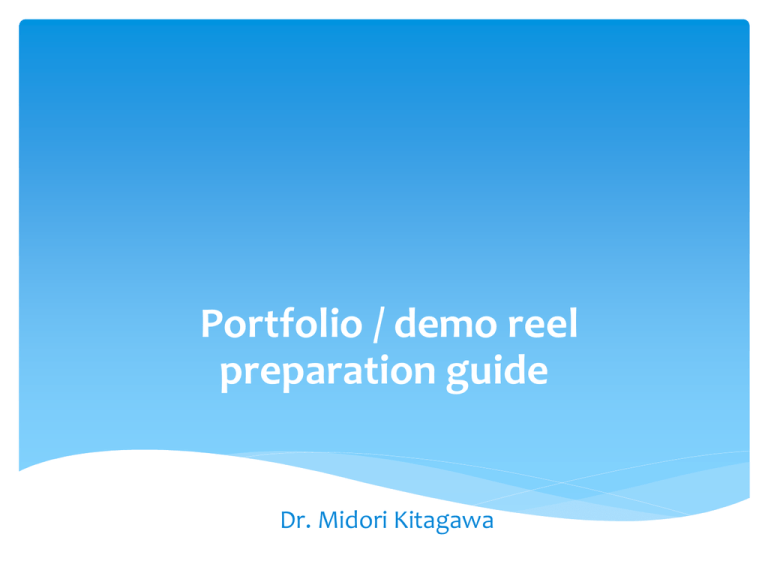
Portfolio / demo reel preparation guide Dr. Midori Kitagawa What’s next? What do you want to do after getting the degree you are currently working on? Graduate degrees Going to a graduate school and getting another degree may be an option. Earning a graduate degree is an investment of your time and money. Many graduate programs offer fellowships and assistantships that pay monthly stipends, tuition and fees. M.A., M.F.A. or Ph.D.? If you want to teach at a four year college or university, going to a graduate school to earn a terminal degree (e.g. M.F.A. and Ph.D.) is a "must". Be aware that a M.A. degree is not a terminal degree, but a Masters of Fine Art (M.F.A.) degree is. Graduate school application: Statement of intent When a statement of intent is required as one of the admission materials, it is often an important factor in the admission consideration. Write about: Academic goals (i.e., what you plan to study while you are in a graduate program) Professional goals (i.e., what you plan to do after graduate school) Reasons why you have selected the graduate program. Have someone proofread it and make sure that there are no misspellings or grammatical errors! What is your strength? If you want to get a job in the industry, find out in what area you have your strongest skills. It is usually in the area that you most enjoy. Focus on your strongest skill Once you recognize your strength: Focus on it (i.e., strengthen your skills in the area) Create works for your portfolio/demo reel that showcase the skills Find a position that matches your skills. Learn about the company and the position that you are applying for. Secondary skill Having a secondary skill in an area that is different from your primary skill area (e.g., your primary in keyframe animation, your secondary in texturing) may allow your employer to keep you longer on the payroll. Ready to be a team player While in school, develop your: Communication skills Organization skills Teamwork skills Learning skills These skills will be as important as technical skills! Industry is smaller than you think The industry is smaller than you think and the people are well-connected. Your reputation will follow you. Start early No matter which direction you are heading to, start portfolio / demo real preparation early. Do not wait until your last semester. Collaborate Do not hesitate to collaborate with your friends on your demo reel. For instance, if you want to make an animation for your demo reel and if you love modeling and animating but not texturing or lighting, find someone who is good at texturing and lighting, and is willing to collaborate with you on your project. Be sure to include a breakdown guide. Be selective Reviewers have hair triggers and are often looking for any reason to slap the book shut and get through the stacks before go home. Don't give them a reason to reject yours. Include only the best of your best. If something doesn't seem quite right with a piece, leave it out. Do not put everything that you have created on a DVD/web site just because there is enough space for it. Be selective, Be selective, Be selective Quality matters much more than quantity. Leave reviewers wanting to see more. If you have long animations, make a compilation of the excerpts that are the best parts from your animations. If your demo reel consists of animations, the total viewing time of your reel should be less than 3 minutes. (Some recruiters say less than around 1 minute!) Label your portfolio / demo reels Companies and schools receive a large number of portfolios and demo reels. Your cover letter and work may be separated and scattered as people show this and that to others. They may forget who and where it came from. Put your contact information on your portfolio / demo reels and on the back of each and every piece you submit. Make sure to put your name on a DVD as well as its case. And of course, test the DVD if it’s playable before you send it off! Best work first Make reviewers want to see what's next. Make them want to see more. No one wants, or is willing, to sit through a 5 or 10 minute piece, looking for what they want to see. Show them in 2 or 3 second clips. That also will win you bonus points for being a thoughtful, professionalstyle applicant. Best work first, Best work first, Best work first Again many places review a large number of portfolios / demo reels. If the first few seconds of your demo reel does not catch reviewers’ eyes, they may stop reviewing your demo reel before it ever gets to "the good stuff". Put "the director's cut" at the end of your reel. If they liked the clips enough they may be willing to see what they came from. They have a lot of work to review. Clean and simple package Make a clean and simple package. No bells or whistles. Since you are not applying for a graphics designer position, the design of your portfolio does not have to stand out. Let your work do the talking. Reviewers generally believe that the flashier the packaging is the more the submitter is trying to compensate for weak work. If you want to become a professional, make it look like the packaged work of a professional. Include reference materials Employers want to see how closely you can follow the preproduction and reference materials (e.g., model sheets, lighting design, and live action footages) given to you. Show the preproduction and reference materials that you used side-by-side with your final products in your demo reel/portfolio. Include a breakdown guide Your breakdown guide should describe each project on your demo reel briefly and your "role" on each project. Don't make them guess what you did or did not do. Never try to get credit for something you didn't do. Your friend may apply to the same companies that you do. It has happened. Include a list of software you used to create each piece as well. Include your resume Your resume should not be wildly creative -- it should be legible! It should include: Full name Address Phone numbers (home/work/cell) Email address (that you can use after graduation) Education Work experience (most recent employment first) Relevant experience (e.g., internship) Have web presence Have your portfolio / demo reel on line. Use SNS to get connected. Showcase your creative talents as well as your technical skills Companies and schools look for both technical skills and artistic abilities in portfolios / demo reels. Production companies and schools want to find people who have unique talents that add something new to their teams. They don't want to hire copycats or software operators who know how to use certain software packages but have no creativity or artistic skills. For instance, Pixar already has people who make Pixar style animations. They must be sick of seeing copies of Luxor Jr. and Buzz Light in applicants' demo reels. Develop your creative talents! Be fresh and unique! Questions? If you have questions or want me to review your portfolio, contact Prof. Midori Kitagawa

